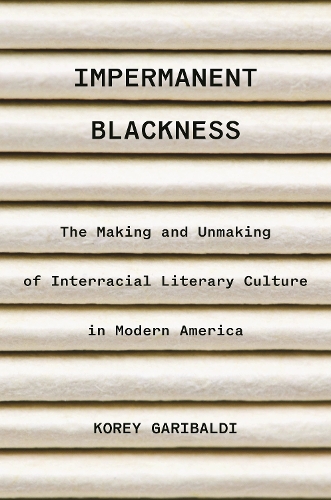
Impermanent Blackness: The Making and Unmaking of Interracial Literary Culture in Modern America
(Paperback)
Available Formats
Publishing Details
Impermanent Blackness: The Making and Unmaking of Interracial Literary Culture in Modern America
By (Author) Korey Garibaldi
Princeton University Press
Princeton University Press
1st June 2025
United States
Classifications
Tertiary Education
Non Fiction
Publishing industry and journalism
Racism and racial discrimination / Anti-racism
810.98960730904
Physical Properties
Paperback
288
Width 156mm, Height 235mm
Description
Revisiting an almost-forgotten American interracial literary culture that advanced racial pluralism in the decades before the 1960s
In Impermanent Blackness, Korey Garibaldi explores interracial collaborations in American commercial publishing-authors, agents, and publishers who forged partnerships across racial lines-from the 1910s to the 1960s. Garibaldi shows how aspiring and established Black authors and editors worked closely with white interlocutors to achieve publishing success, often challenging stereotypes and advancing racial pluralism in the process.
Impermanent Blackness explores the complex nature of this almost-forgotten period of interracial publishing by examining key developments, including the mainstream success of African American authors in the 1930s and 1940s, the emergence of multiracial children's literature, postwar tensions between supporters of racial cosmopolitanism and of "Negro literature," and the impact of the Civil Rights and Black Power movements on the legacy of interracial literary culture.
By the end of the 1960s, some literary figures once celebrated for pushing the boundaries of what Black writing could be, including the anthologist W. S. Braithwaite, the bestselling novelist Frank Yerby, the memoirist Juanita Harrison, and others, were forgotten or criticized as too white. And yet, Garibaldi argues, these figures-at once dreamers and pragmatists-have much to teach us about building an inclusive society. Revisiting their work from a contemporary perspective, Garibaldi breaks new ground in the cultural history of race in the United States.
Reviews
"Eye-opening. . . . Garibaldis conclusions regarding the challenges and opportunities that underpin commitments to building an inclusive American society are timely and penetrating. This is a vital look at a transformative era in American literature." * Publishers Weekly *
"A compelling and readable account of how the relationship between emerging Black authors and their predominantly white-run publishing firms developed in the USA between the 1910s and the 1960s. . . . Impermanent Blackness provides a window on an important aspect of American literary history."---Terry Potter, Letterpress Project
"Impermanent Blackness is a very interesting and insightful read about a key period in American literary culture and publishing."---Ilina Jha, Redbrick Culture
"Garibaldis critical work traces the ups and downs of [the] interracial aesthetic from the beginning of the twentieth century to the 1960s. In the process, he adds another dimension to our understanding of the complex racial dynamics of this era. . . .Garibaldi does an excellent job of describing both the thick history and the wider conceptual stakes."---Paul Giles, Australian Book Review
"Impermanent Blackness is among the most important and original monographs about twentieth-century US print culture Ive read in years, with an argument that should change our understanding of the racial dynamics in US publishing, and thus of the trajectory of US literature itself."---Greg Barnhisel, American Literary History
Author Bio
Korey Garibaldi is assistant professor of American Studies at the University of Notre Dame.
